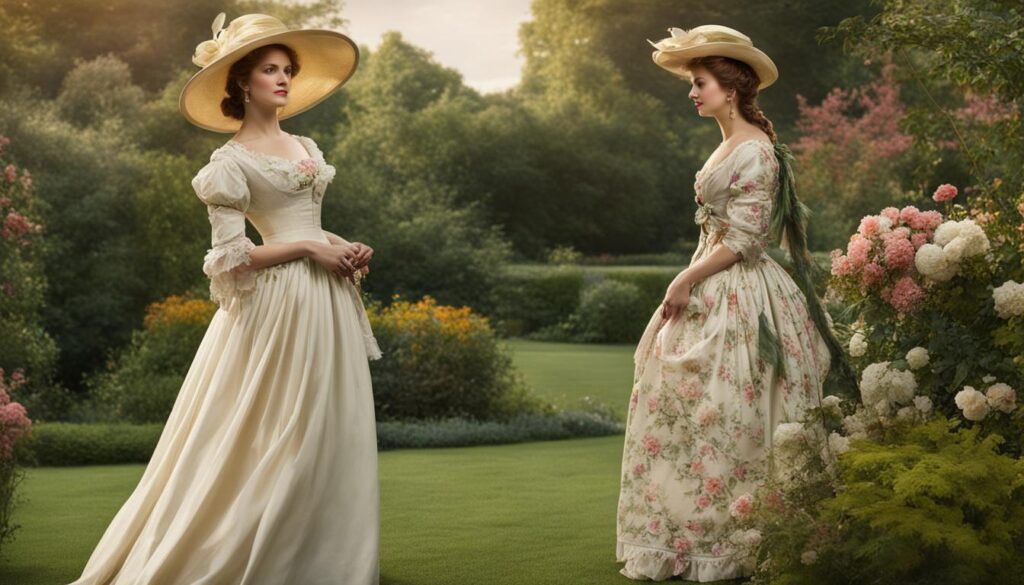The art of storytelling transcends the boundaries of time and format, and the classic romance “Venetia” by Georgette Heyer is no exception. Immortalized through its enchanting narrative set in the opulent Regency period, this literary gem has now been adapted into an audiobook, offering a new modality for audiences to experience Regency-era allure. In this literary review, we delve into the nuances of the audiobook adaptation of one of the most celebrated Georgette Heyer novels, analyzing its resonance with the original work and its impact on the classic romance genre.
The heart of literary romance beats vividly within the pages of “Venetia”, but how does it fare when the prose is lifted from the page and breathed into existence through voice? This audiobook review intends to explore just that, dissecting how the spoken word molds the characters and Regency period charm of Heyer’s work into an immersive auditory experience. Join us as we embark on a journey through the societal tapestry woven by Heyer’s storytelling, brought to life in this engaging audiobook adaptation.
An Introduction to Georgette Heyer’s “Venetia”
Delving into the realms of historical romance and British literature, Georgette Heyer stands as a titan among writers, acclaimed for her wit and period-accurate storytelling. Her novel “Venetia” is no exception, showcasing her unique ability to bring the Regency era to life with engaging characters and dynamic narratives. Heyer’s lasting literary contributions have cemented her work in the annals of the genre, influencing countless others who follow her lead.
The Author and Her Writing Style
Heyer’s writing style has defined a genre, infusing historical romance with meticulous research, sparkling humor, and unforgettable characterizations. Her narration captures the essence of British society during the Regency period, drawing readers into the genteel world of her creation. Heyer’s work exemplifies the very best of historical fiction, bridging the gap between past and present with her vibrant prose.
Overview of “Venetia” and Its Place in Heyer’s Work
“Venetia” stands as a jewel in Heyer’s extensive body of work. Set against the backdrop of the picturesque English countryside, this novel encapsulates the quintessence of Regency romance. With a plot that weaves together love, humor, and a dash of societal commentary, “Venetia” highlights Heyer’s deft skill in creating a world that, while firmly rooted in its time, continues to resonate with readers today. Its place in British literature is secure, not merely as a beloved historical romance but as a testament to Heyer’s enduring impact on the genre.
Plot Synopsis: Navigating Romance and Society
Within the refined world of Regency romance, Georgette Heyer’s “Venetia” stands as a testament to the complexities of love and the intricacies of societal norms. Here, we explore the delicate balance between personal desire and societal expectations, as presented through Heyer’s vibrant characters and thematic elements.
The Characters of “Venetia”
The novel’s character development is pivotal in illustrating the Regency era’s societal norms. As we become acquainted with Venetia Lanyon, the novel’s protagonist, and other central figures, we witness a microcosm of Regency society, complete with its rigid hierarchies and unspoken rules of conduct. Each character’s journey presents a nuanced view into the realities of finding love and happiness within a strict social order.
Themes Explored in the Story
Critical thematic elements make “Venetia” a rich tapestry of narrative finesse. From love’s transformative power to the struggle for independence against societal pressure, Heyer deftly weaves these themes into a story that not only entertains but also provokes thought and reflection on the human experience in a specific historical context.
| Character | Role in Society | Character Development |
|---|---|---|
| Venetia Lanyon | Protagonist navigating societal constraints | Growth from innocence to a deep understanding of love and independence |
| Lord Damerel | Founder of romantic interest and challenge to norms | Evolves from a jaded cynic to an earnest lover |
| Lady Denny | Embodiment of societal expectations | Displays the internal conflict between personal beliefs and societal duties |
Heyer’s portrayal of a society bound by propriety and the quest for personal fulfillment makes “Venetia” not merely a story of romance but a complex exploration of enduring social themes that resonate to this day. The narrative intricately underscores how the path to true love is often fraught with obstacles imposed not just by external forces, but also by internal doubts and hesitations.
Character Analysis: Venetia Lanyon as a Protagonist
Lead character analysis delves deep into the essence of a story, and in the case of Georgette Heyer’s “Venetia,” it is the vibrant and intelligent female protagonist, Venetia Lanyon, who commands our attention. Her character is a fine example of the dynamic nature of literary heroines who have graced the pages of historical romance, offering not just a glimmer of the Regency era’s societal norms but also a fresh perspective on character growth and independence.
At the outset, Venetia might seem like a typical rural beauty, yet it’s her sharp wit and pragmatism that set her apart. Her interactions within a constrained society underscore her resilience and desire to carve out her own destiny. With an undeniable strength of will and vivacity, Venetia challenges the reader’s expectations, embodying the subtle yet powerful transformation that characterizes Heyer’s best works.
Character growth is central to Venetia’s journey. From her contentment with her countryside life to her nuanced understanding of love and relationships, Venetia’s progression as a character is both relatable and aspirational. Her evolution from a young woman content in her protective bubble to someone who confronts life’s complexities head-on provides invaluable insights into Heyer’s craft in character development.
- Venetia’s initial portrayal as self-reliant yet sheltered
- Encounters that challenge her perceptions and spur personal development
- The emerging intellectual depth that defies stereotypical gender roles of the era
- The culmination of her maturity through decisive actions and emotional intelligence
Through Venetia Lanyon, Heyer grants us a window into the subtleties of a female protagonist who is both a product of her time and a figure of timeless appeal. As we peel back the layers of Venetia’s character, what we discover is not just a portrait of a singular literary figure, but a reflection on the enduring facets of human nature and the complexities of growth and self-determination.
By the end of her narrative arc, Venetia transcends the limitations imposed upon her by society, emerging as a fully rounded character whose story of growth inspires a deeper appreciation for the nuanced trajectories of literary heroines.
In closing, Venetia Lanyon’s role in “Venetia” stands as a testament to Georgette Heyer’s mastery of character creation, reminding us why she remains one of the leading figures in the realm of historical romance. It is through the elegantly crafted journey of female protagonists like Venetia that Heyer’s novels continue to captivate and enchant readers across generations.
The Narrator’s Role: Bringing “Venetia” to Life in Audiobook Format
In the realm of audiobooks, the narrator’s capacity for audiobook narration plays a critical role in the story’s conveyance and the listener engagement it elicits. “Venetia,” through its audiobook adaptation, invites listeners into a richly woven tale of Regency romance, with the narrator’s performance pivotal to its impact.

Evaluating the Narration Quality
The quality of voice acting in an audiobook can deeply affect the listening experience. Variations in tone, cadence, and clarity are more than just artistic choices; they’re essential components for effective storytelling. In the audiobook version of “Venetia,” the narrator’s performance is appraised on these factors to determine how successfully they embody the characters and narrative.
How Narration Enhances the Experience of the Story
Audiobook narration can transform the written word into an engaging auditory journey, adding a new dimension to storytelling. Through insightful delivery and emotive voice acting, the narrator enhances the atmosphere of “Venetia,” drawing listeners into Georgette Heyer’s world with a compelling performance that heightens the connection between story and audience.
| Audiobook Element | Contribution to Listener Experience | Specifics in “Venetia” |
|---|---|---|
| Character Voices | Personalization of characters, distinctiveness | Variety in tone and accent to distinguish characters |
| Narrative Delivery | Control of pacing, mood, and suspense | Measured tempo to align with narrative developments |
| Emotional Expression | Conveying emotional undertones of scenes | Subtle voice modulation to reflect characters’ emotions |
| Clarity and Articulation | Aid in understanding and following the story | Crisp enunciation to ensure comprehension |
| Consistency | Engagement without distraction | Maintenance of character consistency throughout |
Audiobook Review: Accessibility and Experience
The rise of audiobooks has undeniably revolutionized the way we consume literature. Among the plethora of audiobook benefits, perhaps the most impactful is the listening accessibility it provides. For individuals with visual impairments, the auditory format breaks barriers, granting them the joy of literature without the need for Braille or screen readers. But it doesn’t stop there; audiobooks extend their reach to multitaskers and busy readers who find solace in literature while engaged in their daily routines.
Consider the “Venetia” audiobook, which offers an exceptional user experience through its tactful and engaging narration. The accessibility features cater to a wider audience, allowing the story to resonate beyond the pages. The convenience of audiobooks also allows for consumption in a variety of settings, whether one is commuting, exercising, or doing chores, enhancing the user experience by fitting seamlessly into the listener’s lifestyle.
The benefits of audiobooks extend even further when it comes to learning and comprehension. For many, listening to a book can foster a deeper connection with the content, improving retention and empathy with the characters through the narrator’s inflections and tempo. This auditory engagement creates an immersive experience that print books may seldom provide, as it adds a new dimension to the narrative, activating different cognitive processes which aid in memory and understanding.
- Accessibility to diverse audiences, including the visually impaired
- Flexibility for those with demanding schedules and lifestyles
- An immersive narrative experience through expert narration
- Enhanced retention and comprehension of the material
Through the lens of “Venetia,” we see the audiobook format not merely as an alternative to reading but as an enriching extension of literary enjoyment. It is a testament to the timeless allure of Georgette Heyer’s work and the innovative ways in which her narratives continue to captivate audiences.
“Venetia” in the Context of Regency Romance
Georgette Heyer’s “Venetia” stands as a paragon of romantic fiction, immersing readers in the nuances of the Regency era. This novel not only highlights Heyer’s masterful storytelling but also serves as a standard for genre comparison within historical romances. With its rich historical detail and captivating narrative, “Venetia” affords a deep dive into the intricacies of early 19th-century English society.
Comparison to Other Works in the Genre
When juxtaposed with other works of Regency romance, “Venetia” shines for its combination of historical accuracy and engaging plotlines. Below, a comparison table outlines how “Venetia” measures up against other celebrated works within the genre, considering factors such as character depth, period authenticity, and lasting impact on romantic fiction.
| Title | Author | Character Depth | Period Authenticity | Impact on Genre |
|---|---|---|---|---|
| Venetia | Georgette Heyer | High | Exceptional | Significant |
| Pride and Prejudice | Jane Austen | High | High | Pivotal |
| The Grand Sophy | Georgette Heyer | Medium | High | Considerable |
Historical Accuracy and Detailing in “Venetia”
Georgette Heyer’s commitment to historical detail is unmatched, and “Venetia” exemplifies this dedication. The novel’s portrayal of the Regency era goes beyond mere backdrops or costume descriptions; it encapsulates the era’s ethos, from dialogue to societal hierarchies. This solid foundation in historical accuracy not only enriches the reading experience but also lends an authoritative voice to the romantic fiction genre.

Understanding Georgette Heyer’s Audience Appeal
In the realm of literary success, few authors can boast the lasting influence and audience appeal that Georgette Heyer has achieved with her work. Heyer’s novels, especially “Venetia”, have maintained an enduring popularity that transcends the passage of time, drawing in an avid modern readership and cementing her literary legacy.
Why Georgette Heyer Continues to Captivate Readers
Heyer’s ability to craft characters and plots with depth and humor has been a significant factor in her wide-reaching appeal. She combines meticulous historical research with ingenious storytelling to weave tales that are as educational as they are entertaining. This unique blend has rendered her works perennial favorites, not only among aficionados of historical romance but also among those who appreciate well-written literature.
“Venetia” and the Modern Reader: A Timeless Appeal?
The question of what constitutes timeless literature often arises, and “Venetia” serves as a compelling testament to tales that can withstand the test of time. Heyer’s narrative strength lies in her universal themes of love, societal pressures, and the pursuit of personal happiness—topics as relevant today as they were in the Regency period.
Heyer’s work not only entertains but also provides a window into the customs and social dynamics of a bygone era, offering continual insight for today’s readers.
Moreover, the modern readership’s fascination with escapism into worlds that offer both charm and wit, combined with the comfort of historical escapades, ensures that Heyer’s legacy endures. Her literary technique, characterized by engaging dialogues and a rich setting, resonates with contemporary audiences, proving that her impact on the genre is both significant and ongoing.
| Key Component | Impact on Reader Engagement | Relevance to Modern Audience |
|---|---|---|
| Character Development | Generates emotional investment and relatability | Characters face timeless struggles and personal growth |
| Historical Accuracy | Enriches the reading experience with authentic detail | Provides educational value and context |
| Thematic Resonance | Invokes reflection on social and personal dynamics | Themes of self-discovery and love are universal |
| Escapist Narrative | Delivers pleasure and entertainment | Offers reprieve from contemporary life stresses |
The continuous discovery of Heyer’s novels by new generations, as well as their adaptability to various forms such as audiobooks, ensures that her stories persist at the forefront of romantic historical fiction. It is this multi-dimensional appeal that secures her position as a cherished author in literary circles and among readers worldwide.
Conclusion
In our comprehensive journey through the romantic alleys of Georgette Heyer’s “Venetia”, we have uncovered the intricate tapestry that constitutes this Regency classic’s unyielding charm. Through the lens of the audiobook adaptation, we have experienced the melding of Heyer’s eloquent prose with the dynamism of auditory storytelling. As we assess “Venetia” in terms of its lasting appeal, we find its literary impact unwavering, resonating through the decades as an epitome of historical romance.
Assessing the Lasting Impact of “Venetia”
“Venetia’s” prominence within British literature continues to affirm its status as a definitive work that transcends time. The keen attention to historical detail, coupled with the development of complex characters, secures Heyer’s novel as a benchmark for the genre. It is the depth of her writing that ensures the novel’s lasting appeal, as it endears itself to each new generation of readers eager to explore the textures of Regency romance.
Final Thoughts on the Audiobook Experience
The audiobook format of “Venetia” serves not just as a homage to its original form but elevates the experience for today’s audience. With the narrator’s skillful delivery breathing new life into the text, listeners are afforded a visceral engagement with the narrative, granting an immersive entry into the gilded ballrooms and wistful countrysides of Heyer’s creation. This final review applauds the adaptability of the audiobook, affirming its role in enhancing the novel’s accessibility and enduring legacy. “Venetia”, both as a literary masterpiece and as an audiobook sensation, remains an indelible contribution to the treasures of romantic fiction.



